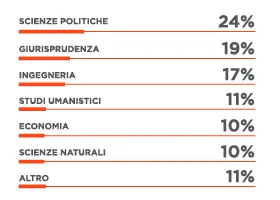
This Master aims at developing the profile of “Public Innovation Manager” or “Public Value Manager”, starting from the knowledge, enhancement and development of the set of knowledge and skills already present in the Regional Administration and the other Public Administration authorities present in the Emilia Romagna region, with the aim of creating a leading class and a local professional community, able to work in a network for the development of the Emilia-Romagna region.
Thus, the Master’s intends to train a manager able to lead the public administration towards the creation and protection of the Territorial Public Value, that is, towards the joint improvement of the level of social, economic, environmental (and today also health-related) well-being of users, of the different stakeholders, citizens (that is towards the sustainable development of the areas) using highly innovative methods and tools, originated from the best managerial practices, both public and private, national and international and starting from the care and the improvement of the resources’ health (human, economic-financial, instrumental, material and digital of the bodies and the geographical area).
The Public Value Manager will support the political bodies in the implementation of European, national, and regional policies, starting from the 2021-2027 European planning and the regional and local political governance mandate program and making use of measuring tools to assess the effects of policies on the territories.
The program includes 10 core courses accompanied by applicative and experiential activities, designed in a complementary way in relation to the courses. Among these, we can list the Innovation Labs, Focus Sessions, Leaders’ Corners, International Workshops, Hackathons, Company Visits. The Master’s ends with a team Project Work: participants will have to develop an innovative and applicative project, in agreement with a specific body, enabling them to practically implement the tools and skills they’ve learnt.
THE MASTER’S IS AN INVESTMENT. THE LOAN IS THE WAY TO FUND IT.
Accreditation

Bologna Business School is EQUIS – EFMD Quality Improvement System accredited, one of the most important international quality assessment and continuous improvement systems for Schools of Management and Business Administration.
Structure
The Master’s lasts 14 months, it features 47 face-to-face teaching days around 27 residentials (Friday and Saturday, every two/three weeks) for a total of 1500 hours between teaching hours and activities carried out individually or in a team (study, exercises, project work…). In addition to the residentials, there will be the final day when the Project Works are presented.
CORE COURSES
The program includes 10 core courses: 9 “sequential courses”, on economic, economic-corporate, IT, sociological topics lasting 2 days and a transversal course to provide participants with a multi-disciplinary and integrated view of the Public Administration, problem solving-oriented rather than focused on an individual discipline.
FOCUS SESSIONS
There will be 6 in-depth seminars, lasting one day each, aimed at transferring methodological know-how and applicative tools. The sessions will be held by Italian and foreign academic instructors and by managers from public and private organizations: Sustainability Transition Management; Strategic Planning; PPP: Public – Private Partnership; Crisis Management; Blockchain and Smart Contract; Cybersecurity.
INNOVATION LABS
Interactive labs on innovative, applicative experiences, aligned to theme-based courses, led by Italian and foreign Instructors and Professionals. The participants in the course will experience a full immersion in true interactive guided simulations, on innovation topics applied to public management. For example, the Master Game is a guided simulation, through a cloud platform, on the subjects of Performance Management and Risk Management. After being divided into groups representing the different Public Administrations, the Master Game’s participants will engage in a challenge and will exchange views on hypotheses of planning, measurement, assessment, and accounting of their PAs (Public Administrations), having to tackle emerging situations that alter the planned scenario”.
COMPANY VISITS
These are “outdoor training” activities enabling participants to exchange views and ideas with managers and entrepreneurs about experiences of management excellence of innovation in private companies and PAs, also with the aim of improving the relationship of collaboration between the former and the latter, in a fundamental pact for the development of territories. Among the possible company visits we may mention:
- Visits to innovative companies (for example, Yoox Net – A – Porter, Amazon, Ducati, Lamborghini, Dallara, Ferrari, Philip Morris, Scm, Twin Set – Simona Barbieri, Chiesi, Sacmi, Barilla)
- Visits to innovative PAs (for example, San Raffaele)
- Participation to the ForumPA event.
LEADER’S CORNERS
Operational experiences on the subjects of the theme-based courses narrated by Administrators, private and public international and national Managers, Employees of excellent PAs, qualified Professionals and Consultants from the private sector. The learning process will take place through the dialogue and the interactive exchange of views with the rest of the class.
INTERNATIONAL WORKSHOPS
Comparisons of local experiences recalled by General and Administrative Managers and those in charge of the digital transformation of European Cities. The learning process will take place through the dialogue and the exchange of views with individuals from different contexts, organizations, and countries. With the aim of ensuring an international outlook, particular attention will be devoted to the selection of testimonials from foreign countries, able to provide relevant accounts for participants. Specifically, 3 International Workshops will be held.
INTERNATIONAL WEEK: Public Management Innovation. The European Challenge
The international week will enable participants to delve deeper into the European framework of the public administrations interventions to govern the digital transformation of organizations and society, through the perspectives of two institutions that represent European excellences in research and education.
PROJECT WORK
Each participant will work with the support of the instructors to create an innovation project for the Authority they belong to. In this way, having attended the master’s will trigger and support real innovation initiatives. Participants in the development of the project works might be supported by the faculty and coordinators, both remotely and during specific in-person work sessions.
The Project works will be part of the final assessment and will be presented during the Master’s closing day.
HACKATHONS
The participants, divided into groups, work on specific topics and company criticalities proposed by an external testimonial (ex. an executive or a public administrator). Every group has at its disposal a certain number of hours to propose solutions to the topic presented. The Hackathon ends with the presentation of the solutions to the testimonial.
COURSES
The institutional mission of Public Administrations is the creation and protection of Public Value in favor of their users, of citizens and, more in general, of public, private, and not-for-profit stakeholders of the specific geographical area, that is, the joint and balanced improvement of the levels of social, economic, environmental (and during a pandemic also health-related) well-being of said subjects.
An administration creates Public Value when it can finalize performances – institutional, organizational, and individual – (Performance Management) towards the joint improvement of the levels of well-being, starting from the care and improvement of the health-related level of its resources (human, economic-financial, instrumental, material, and digital).
An administration protects the Public Value when it is able to prevent and/or manage risks –strategic, operational, economic-financial, corruption-related, IT-related, of safety, transparency, privacy, health-related, etc.– (Risk Management), so as to reduce the non- or partial achievement of policies and performances and thus to prevent the erosion of Public Value.
The creation and protection of Public Value is therefore achievable when administrations are able to plan, measure, assess, report performances and risks in an integrated and finalized way.
The Public Value Manager will be able to plan and govern the Integrated System of planning, measurement, assessment, accounting of performances and risks of their own PA in the perspective of the creation and protection of the Public Value, that is the improvement of the level of fair and sustainable well-being for users, citizens, and stakeholders.
Deidda Gagliardo EnricoThe increase of effectiveness of the geographical area policies and strategies (local and regional), also considering the national and European ones, presupposes an improvement in the ability to plan first and then analyze the economic, social, environmental, health-related, productive, technological impacts etc., with the final goal of increasing the Public Value of territories.
The Public Value Manager will be able to support the administration in the definition of public policies and strategies for their implementation, also within a public-private partnership.
Di Tommaso Marco RodolfoThe creation of Public Value, within the perspective of a fair and sustainable well-being, through the control of public policies and strategies and their related national, regional, local performances presupposes the improvement of the processes and tools of the internal, external, and territorial governance of the administrations, in the context of the European public governance. All of this from the perspective of the construction of true chains of co-creation of Public Value.
The Public Value Manager will be able to support the administration in its internal governance (region, province, metropolitan area, municipality, other PA) from the perspective of the generation of Public Value; the Manager will be able to support the administration in its external governance (private-public companies and GAP – Gruppo Amministrazione Pubblica – Public Administration Group) from the perspective of the creation of Public Value; the Manager will be able to plan and govern the re-design of the territory’s institutional architectures, with reference to the creation of public networks or the strengthening of unions of municipalities and of other local forms of association, to the merging of municipalities, from the perspective of the co-production of value for the territory, together with the territory.
Deidda Gagliardo EnricoThe public governance of PAs increases the effectiveness of policies and public strategies and of their related performances in the perspective of the creation of Public Value, where a culture of people management is designed and nurtured. Organizing and managing effectively, at every level, and in any organizational context, requires a developed ability to enhance people and their soft skills: in other words, it’s necessary to create the conditions so that people can and want to give the best of themselves. Therefore, it’s a question of conveying motivations, of helping people take effective decisions, of managing productive organizational and interpersonal relationships, of disseminating problem solving abilities, of change management, proactivity, flexibility, identification with the team and the organization. These are the essential ingredients for a truly effective leadership. To this aim, nonetheless, the experience and sensitivity of the leader are important elements, but still not sufficient. It’s a question of being able to use simple but powerful techniques, as they’re based on the scientific knowledge sets on people, on their behavior and their individual and group psychology and being able to combine them with organizational and managerial sets of knowledge. A modern, aware, and effective leadership is necessarily based on such a crossroads of disciplines, knowledge sets and techniques. The course will provide these fundamental knowledge sets, leveraging on already available practical examples, in particular in public contexts, which will help participants not only to assimilate such knowledge sets but also to imagine how to apply them, practically, in their work context.
The Public Value Manager will be able to design and govern the management and development systems of human resources and will be able to use management, productivity, motivation and enhancement tools for public employees and executives, from the perspective of the organizational well-being. The skills acquired during this course are cross-cutting, as they’re helpful to develop the professionalism of individuals at every level, in every sector and organizational area. Such skills will be of help for both leaders at every level to improve their effectiveness in their decision-making and coordination activities, and collaborators for them to increase their awareness about the role they can play within teams and organizations, to build more rewarding relationships with the others and derive a higher and more satisfying meaning from their work.
Masino GiovanniThe public governance of PAs increases the effectiveness of policies and public strategies and of their related performances in the perspective of the creation of Public Value, where specific innovative organizational models are designed. The organizational design has the aim of understanding the way in which an organization works, and what determines organizational behaviors in order to provide the management with methods and tools to design the piece of organization they lead. The contents include the systemic view of the organization and design tools which are result-oriented, and also directed towards administrative simplification and accountability. The analyzed tools go from process reengineering to the lean approach.
The Public Value Manager will be able to design innovative organizational models in the framework of process simplification, fostering an adaptive organizational culture. The Manager will be able to understand the determining features of their organization, in terms of processes and behaviors. Secondly, the Manager will design the organization defining organizing roles and modifying organizational processes. Thirdly, the Manager will be aware of which methods and techniques are relevant to generate the organizational change, and finally will be able to propose to other organizational levels the necessary changes to pursue their goals, in the framework of simplification and accountability as for results.
Zangrandi AntonelloThe public governance of PAs fosters the effectiveness of policies and public strategies and of their related performances where the PA’s economic, financial and assets health are measured, together with their compatibility and functionality with the national and European investment and funding policies. The current historical period is novel for the national, European, and global economy, and this analysis perspective cannot avoid the need to consider the decisive role of public finance to face the challenges of the post Covid-19 phase. The role of local authorities, that is the “the most exposed and sensitive terminals of the Republic” (quoted from the Italian President of the Republic) on which this module focuses, will be crucial.
The Public Value Manager will be able to locate the main issues of the local Italian PAs’ financial management within the European context; the Manager will be able to recognize the funding mechanisms of the different local Italian public administrations, with specific reference to municipalities; the Manager will be able to read and interpret the balance sheets of a local PA ; the Manager will be able to analyze the state of financial health through balance sheet indexes; the Manager will be able to identify which are the features of higher financial vulnerability.
Padovani EmanueleThe fair well-being and sustainable development represent key elements for the governance of the PA at a global, European, national, regional, and local levels: they contribute to the definition of strategies in view of the current and potential risks for the administration, they drive innovation, they require stakeholder engagement, they make it necessary to overcome new accounting and performance measurement challenges, they require new reporting tools and get translated into Public Value created for the community and the stakeholders.
The Public Value Manager will be able to understand the impact of sustainability on the creation of public value; the Manager will be able to identify the strategies and risks of a transition towards sustainability in the PA; the Manager will be able to determine the role of stakeholders and the forms of engagement towards sustainability; the Manager will be able to design and govern the policies and tools of the fair well-being and of sustainability and will operate according to a “Sustainability–Oriented-Innovation” approach in the framework of the BES (ISTAT-CNEL) and the Sustainable Development Goals (SDG) of the UN 2030 Agenda; the Manager will be able to distinguish the new forms of accounting, performance measurement and reporting linked to sustainability; the Manager will be able to develop a sustainability and Public Value vision that can be applied in specific scenarios (COVID and other challenges).
Orelli RebeccaThe course illustrates the way in which the traits of Accountability systems in companies and public administrations have developed over time, providing participants with the theoretical interpretation keys for the processes underway, for the shared creation of Public Value, contextualizing the reference models and frameworks with practical applications, operational experiences and guided simulations on the topics dealt with during the course, also through presentations by experts coming from public administrations of excellence and private companies.
The Public Value Manager will be able to manage the accountability & citizen participation systems within the public companies and administrations, with a particular view of the recent development concerning the creation of Public Value and involvement of the stakeholders in the processes of co-production of social, economic, and environmental impacts, that are relevant from the perspective of sustainable development.
Paletta AngeloThe course will not feature in the sequential rationale of the other courses, but it will cut across the nine theme-based courses. Some topics of particular relevance and topicality mentioned during the Core Courses according to an economic, economic-corporate, organizational, economic-management engineering, sociological, IT perspective, will also be analyzed according to the legal perspective, with the aim of providing participants with suitable regulatory tools for an interdisciplinary and integrated interpretation of the Public Administration.
The Public Value Manager will be aware of the regulatory framework of theme-based courses and will have at their disposal useful legal tools to develop an interdisciplinary and integrated analysis of the Public Administration.
Bonetti TommasoIn a rapidly changing scenario, the PA must act on two levels: modifying internal processes, adapting them to the digital context and prioritizing and adopting IT services for its interlocutors. Such changes require new skills and must be based on a culture that relies on data enhancement, on quality goals, on continuous improvement, and on governance, within the framework of national and European digital strategies and policies. A few relevant topics (cybersecurity, blockchain and digital transformation) will be dealt with during theme-based days.
The Public Value Manager will be able to accompany the growth of the PA in a perspective of development of IT services, in line with the Digital Agenda for Europe and the AgID IT plans. The Manager will know the main enabling technologies of the digital society, cloud and big data, the modes to express requirements, and the methods to support the digital transformation, also in view of the unimpressive reports on the status of implementation of public IT technology plans.
Colajanni MicheleMarchetti Mirco
Learning approach
The Master’s take place in two different locations: a physical one (Villa Guastavillani, headquarters of Bologna Business School) and a virtual one (the e-learning platform).
The courses may follow a linear path, divided into weekly modules, or develop around periodic meetings distributed ad hoc during the Master’s. The study activity mainly occurs on the online Moodle platform, constantly monitored by the course instructor and tutor, who are available for clarifications and in-depth information on the exercises that are carried out, on the case-studies and the other activities.
Faculty
Faculty members at Bologna Business School work together offering outstanding teaching standards. An international and interdisciplinary approach is guaranteed by a joint team of distinguished national core professors, adjunct, visiting professors, guest speakers and top managers.
-
Tommaso Bonetti
Associate Professor
University of Bologna
-
Michele Colajanni
Full Professor of Computer Engineering
University of Bologna
-
Enrico Deidda Gagliardo
Full Professor of Busines Administration
University of Ferrara
-
Marco R. Di Tommaso
Full Professore of Applied Economic Studies
University of Ferrara
-
Kostantinos Langas
CEO
Proti Consulting
-
Mirco Marchetti
Associate Professor
University of Modena and Reggio Emilia
-
Giovanni Masino
Full Professor
University of Ferrara
-
Rebecca Orelli
Associate Professor
University of Bologna
-
Emanuele Padovani
Full Professor
Univesrity of Bologna
-
Angelo Paletta
Full Professor of Business Administration
University of Bologna
-
Antonello Zangrandi
Full Professor of Public Management
University of Parma
CLASS PROFILE 2018-21
ACADEMIC BACKGROUND

The course is meant for:
– employees of the public administration, both those residing in the Emilia-Romagna region and from other regions
– individuals who provide services to the Public Administration
– individuals not employed in the public administration interested in developing public management skills.
The Public Value Manager’s profile will be able to lift their organizational gaze from the contingent and specific work condition and to finalize the administrative action towards the development of the authority, the creation of Public Value for the area, thanks to an adaptive organizational culture, able to recalibrate itself in a resilient manner, if necessary, and proactive, if suitable, in relation to the changed institutional, social, economic, environmental, health-related contexts, having as their guiding star the fact of meeting the needs of citizens and improving their well-being.
The Public Value Manager will be trained on the cross-cutting soft skills, they will be able to lead collaborators along pathways of human resource development (as per what is included in the Italian Guidelines 5/2019 of the PA Department) through leadership styles inspired by ‘the nudge’, fostering the transition from hierarchical organizational logics to cross-cutting process ones, inspired by a digitally-informed simplification.
The Public Value Manager will be able to lead their authority towards the co-creation of Public Value, which means involving the authority’s personnel, citizens, and the public, private, and not-for-profit stakeholders of the territory, in the different stages of the cycle of planning, management, measurement, assessment and accounting of policies and performances, according to a collaborative governance approach. Therefore, the Public Value will be created with the participatory contribution of the latter, observed through their eyes, and retold with their words, as per what is included in the Italian Guidelines 4/2019 of the PA Department.
The Public Value Manager will be able to improve the effectiveness and transparency of processes, to attract new investors, to bridge the digital gap, to transform services, to introduce data-led governing policies, to improve the access to and management of information, to increase citizens’ satisfaction and trust, to balance stakeholders’ needs with costs simultaneously optimizing the effectiveness, to measure and assess the impact of policies and strategies.
The Public Value Manager will have an international training profile, in virtue of the international outlook of the Master’s teaching approach (through the comparative exploration with other European PAs, the so-called “International Workshop”), the carrying out of international experiences at other European PAs (through an “International week)”.
The Public Value Manager will have a cross-cutting and integrated training profile in virtue of the interdisciplinary scientific-teaching approach (legal, economic, economic-corporate, organizational, economic-management engineering, sociological, IT) of the Master’s, problem solving-oriented.
Alumni

Sabrina Franceschini
Citizenship Communication Area Manager; Emilia-Romagna Region
Public Management and Innovation
"Thanks to this Master’s I’m bringing into a theoretical and more strategic framework topics and concepts that I used to apply empirically in my professional activity. This is possible both thanks to the high profile of the faculty and the program’s contents, but also thanks to the possibility to exchange views with the other fellow participants. The relationships we have built are already enabling us to work together and better on common projects and having shared this pathway we have laid the foundations for a common background among people with very different professionalisms. A professional and personal enhancement, through and through."

Andrea Nanni
Administrative Officer, Emilia-Romagna Region
Public Management and Innovation
"After years of experience as an administrative officer, I felt the need to expand my horizons and acquire managerial skills in the field of public action and the possibility of innovation offered by the new technologies, both with reference to internal processes, and in the area of services to the citizens. All of this in a dynamic and stimulating environment which also helped me to build a network of acquaintances which undoubtedly represent an added value of the Master."

Lodovico Gherardi
Coordinator of the Authority for the Management of the European Territorial Cooperation Programme ADRION, Emilia-Romagna Region
Public Management and Innovation
"After twenty-six years in the Public Administration, where I always held technical roles, I felt the need to put myself to the test expanding my knowledge store with new managerial skills that could expand my view of the Public Administration and that could allow me to become an active part of its evolution. Taking part in the Master’s was the answer to my educational needs and it enables me to integrate my skills in an intellectually dynamic and stimulating environment."

MARCELLO CAPUCCI
Responsabile Servizio Qualità Urbana e Politiche Abitative Direzione Generale Cura del Territorio e dell’Ambiente
Master in Public Management and Innovation II
"My work in the fields of urban and social regeneration is always oriented towards listening to and understanding phenomena and innovating processes. My technical training has supported me for a long time, but the dynamics are increasingly complex and articulated, and it is necessary to explore solutions and ideas even through disciplines and territories that are not my own. Also, everyday work imposes knowledge and skills that you often learn by doing, but which soon require a more organic systematisation so as not to become chaotic. This is what the Master's course was all about: an opportunity to go deeper and "tidy up", feeling better equipped to do one's job, also thanks to the possibility of getting to know the qualities and skills of one's fellow students."
Networking
The Master’s course in Public Management and Innovation is a Master’s made of people, in which formal and informal opportunities are developed, with the exchange of views and facilitation of the exchange of ideas and experiences among participants.
The networking develops among the students of the same class, between participants and instructors, and with the students of other paths or from previous editions of the same Master’s. Therefore, a network of relationships is generated, which is fundamental for one’s own business, that grows during the Master’s and it continues also after the end of the pathway.
Program Advisory Committee
The aim of the Program Advisory Committee is to define the strategic guidelines for the construction of the current and future teaching activities of the Master’s in Public Management and Innovation and to maintain a consistent alignment between market, Public Administration and School.
The Program Advisory Committee includes among its participants professionals working in management, digital and technological innovation at a national and international level.
- Lorenza Badiello, Head of the Emilia-Romagna Region Delegation to the EU
- Antonio Davide Barretta, General Director of the Azienda Ospedaliero-Universitaria Senese
- Paolo Coppola, Associate Professor of Computer Science, University of Udine
- Luciano Gallo, Novia Srl and Arvest
- Francesco Raphael Frieri, General Director for Resources, Europe, Innovation and Institutions, Emilia-Romagna Region
- David Harris, Sole Director, Harris Consulting
- Konstantinos Langas, Managing Director, Proti Consulting
- Chiara Morandini, General Director, Municipality of Trento
- Monica Parrella, General Manager Presidency of the Council of Ministers
- Andrea Tardiola, General Manager INAIL
- Umberto Tossini, Chief People, Culture & Organisation Officer Automobili Lamborghini
COMPANIES
ACADEMIC BACKGROUND
FEES
The enrollment fee to the Master’s amounts to 16,200 (VAT exempt) to be paid in 3 instalments as indicated in the notice.
The fee covers the attendance to the Master’s, all the study material available through the on-line platform and the access to the Bologna Business School’s services, which includes: personal wi-fi account, use of the PCs in the Computer Lab, use of the study areas, access to the internal gym, discounts for the School restaurant.
The fee entitles participants to attend teaching support activities such as the master lectures, upon invitation.
Ample free parking is available in the School grounds.
Furthermore, with the Student Card of the University of Bologna, participants can access: all university facilities, among which are over 100 libraries, digital resources, discounted fees in a series of affiliated structures and study rooms (including on-line databases and subscriptions). Further information is available on the website of the University of Bologna: http://www.unibo.it/it/servizi-e-opportunita
TAX RELIEF
Companies that make investments in education 4.0 aimed at the acquisition or consolidation, by the company’s employees, of skills in the technologies relevant to the implementation of the process of technological and digital transformation can take advantage of the tax credit in 2022 provided by the “National Plan Enterprise 4.0”. For more information, click here.

Funding
Study loan favorable condition
– Reduced rate
– Payable in 10 years
– Possibility to postpone the payment of the first installment up to 36 months.
For information, please write to master.pa@bbs.unibo.it
REQUIREMENTS
The Master’s is addressed exclusively to candidates in possession of a Laurea Magistrale, Specialistica or Vecchio Ordinamento degree.
The Public Value Manager will be able to lift their organizational gaze from the contingent and specific work condition and to finalize the administrative action towards the development of the authority, the creation of Public Value for the area, thanks to an adaptive organizational culture, able to recalibrate itself in a resilient manner, if necessary, and proactive, if suitable, in relation to the changed institutional, social, economic, environmental, health-related contexts, having as their guiding star the fact of meeting the needs of citizens and improving their well-being.
The Public Value Manager will be trained on the cross-cutting soft skills, they will be able to lead collaborators along pathways of human resource development (as per what is included in the Italian Guidelines 5/2019 of the PA Department) through leadership styles inspired by ‘the nudge’, fostering the transition from hierarchical organizational logics to cross-cutting process ones, inspired by a digitally-informed simplification.
The Public Value Manager will be able to lead their authority towards the co-creation of Public Value, which means involving the authority’s personnel, citizens, and the public, private, and not-for-profit stakeholders of the territory, in the different stages of the cycle of planning, management, measurement, assessment and accounting of policies and performances, according to a collaborative governance approach. Therefore, the Public Value will be created with the participatory contribution of the latter, observed through their eyes, and retold with their words, as per what is included in the Italian Guidelines 4/2019 of the PA Department.
The Public Value Manager will be able to improve the effectiveness and transparency of processes, to attract new investors, to bridge the digital gap, to transform services, to introduce data-led governing policies, to improve the access to and management of information, to increase citizens’ satisfaction and trust, to balance stakeholders’ needs with costs simultaneously optimizing the effectiveness, to measure and assess the impact of policies and strategies.
The Public Value Manager will have an international training profile, in virtue of the international outlook of the Master’s teaching approach (through the comparative exploration with other European PAs, the so-called “International Workshop”), the carrying out of international experiences at other European PAs (through an “International week)”.
The Public Value Manager will have a cross-cutting and integrated training profile in virtue of the interdisciplinary scientific-teaching approach (legal, economic, economic-corporate, organizational, economic-management engineering, sociological, IT) of the Master’s, problem solving-oriented.
APPLICATION PROCESS
Admission to the Master’s is subject to passing the selection process consisting of:
- an examination of the candidates’ CVs and the verification of the access requirements
- a written text
- an interview with the Master’s Direction aimed at verifying the candidate’s professional project and their consistency with the Master’s goals
- Professional experience in public administration and knowledge of English would be an advantage.
For information on the admission notice to the Master in Public Management and Innovation –you can call us +39 051/2090104 or write an e-mail to master.pa@bbs.unibo.it
CALL FOR APPLICATIONFAQs
Registration for the selection procedures) must be carried out online at www.unibo.it/Portale/Guida/StudentiOnline, following the operational instructions attached to the call for applications.
For more details see the announcement at the following link Announcement of competition for admission to the (unibo.it)
The Program Manager can provide certificates of attendance at the end of classes to those who request them, after verification of actual attendance.
The course is reserved for candidates who, at the enrolment deadline, possess the following qualifications and entry requirements:
All single-cycle master’s and master’s degree classes awarded pursuant to Italian Ministerial Decree No. 270/04 (or second-cycle or single-cycle degrees awarded pursuant to the previous Italian Ministerial Decree No. 509/99 and the Old Order).
For more details see the announcement at the following link Announcement of competition for admission to the (unibo.it)
Yes, it is a 2nd level University Master of the University of Bologna, University of Ferrara, University of Parma and University of Modena and Reggio Emilia.
Yes, there is a certificate upon successful completion of all courses, the final examination and 70% attendance. The certificate will attest to successful completion of the courses and will award 60 university credits (CFU).
Yes, it is possible to deduct the cost of the Master’s degree because it is a university course. However, we suggest that you consult your accountant or professional advisor.








